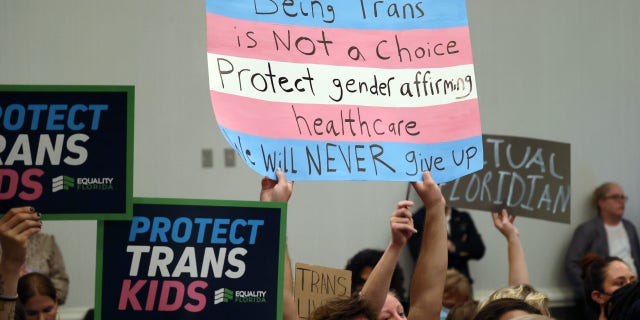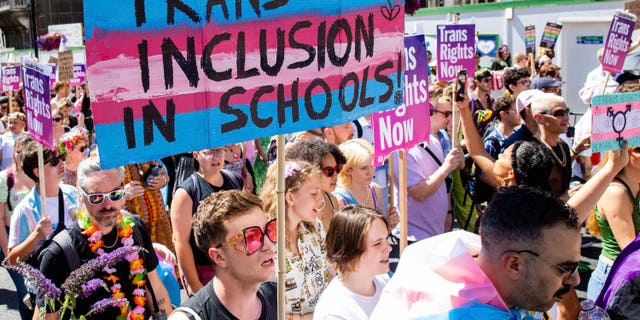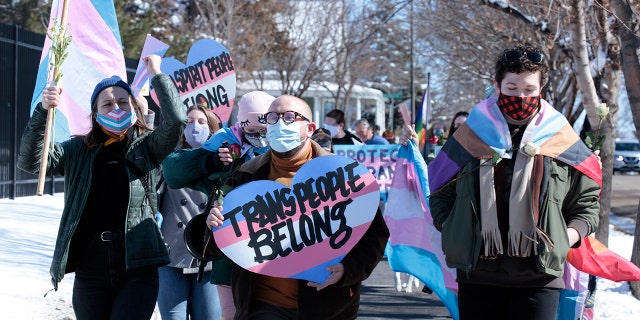

The Beacon elaborated that gathering census data plays a critical role in the everyday administration of the Office of Child Development and Early Learning as a whole.
"The state's Office of Child Development and Early Learning, which funds health and social programs for young children, requires providers to report demographic information on their cases—including, since 2022, the gender identity of infants," The Beacon said. "Data collection forms for the agency now ask for newborns' "gender" rather than their sex and allow providers to select male, female, or ‘Gender Non-Binary.’"

People hold signs during a joint board meeting of the Florida Board of Medicine and the Florida Board of Osteopathic Medicine gather to establish new guidelines limiting transgender procedures in Florida, on Nov. 4, 2022. (Ricardo Ramirez Buxeda/Orlando Sentinel/Tribune News Service via Getty Images)
The purported screenshots of the forms show an option to designate a child as "Gender Non-Binary," with an explanation "Includes those enrolled participants who do not identify as either male or female, which may include participants who identify as gender non-binary and/or genderqueer."
The outlet emphasized, "Providers must fill out these forms to receive funding from the office."
The article went on to quote one Pennsylvania social worker, ""I have to ask clients, 'Is your 10-day-old male, female, or nonbinary?'"
However, a representative from the agency reportedly indicated otherwise.
"This is a field for data collection," Ali Fogarty, the department's communications director, reportedly told The Beacon. "There is no directive or expectation that parents be verbally or explicitly asked if their children are nonbinary."
Pennsylvania’s Department of Human Services has not yet responded to inquiry from Fox News to confirm the legitimacy of the screenshots shared by The Beacon or to explain how a child would be designated as nonbinary by a social worker.

A protester voices support for the promotion of transgender ideology in schools during a pro-transgender march in October 2022. (Mark Kerrison/In Pictures via Getty Images)
The Beacon went on to quote Leor Sapir, a fellow at the Manhattan Institute said, who observed how some European policies make professionals far more hesitant to affirm gender dysphoria in order to test whether it is a passing phase.
"’The simplest explanation is that if you socially transition kids, most won't come to terms with their body,’ Sapir said. That's one reason why many European countries now embrace a policy of ‘watchful waiting,’ in which caregivers don't affirm a child's gender dysphoria until it has persisted for some time."
The article noted that Pennsylvania may be far more quick to affirm gender dysphoria.
"Forms like Pennsylvania's encourage the opposite approach, Sapir said. If social workers suggest to parents that young children can be nonbinary—or if they suggest that to children themselves—it could promote the culture of knee-jerk affirmation that's been linked to gender dysphoria."

Advocates for transgender people march from the South Dakota governor's mansion to the Capitol in Pierre, South Dakota, on March 11, 2021. (AP Photo/Stephen Groves, File)
The Beacon quoted the same unnamed social worker claiming that positing these questions to parents of children at such a young age has unforeseen consequences.
"’These questions plant the seed in parents,’ the Pennsylvania social worker said. Kids will be more likely to identify as nonbinary, she added, if the label is ‘legitimized’ for them at a young age."
